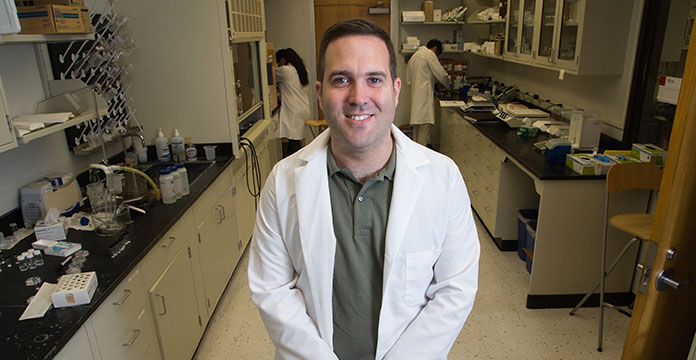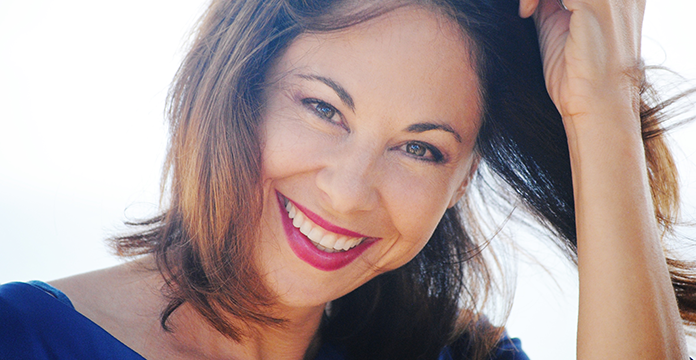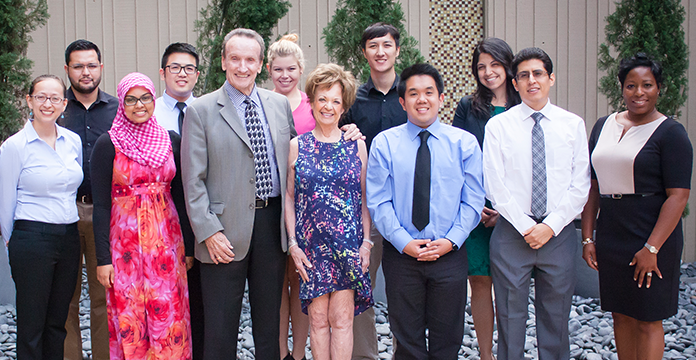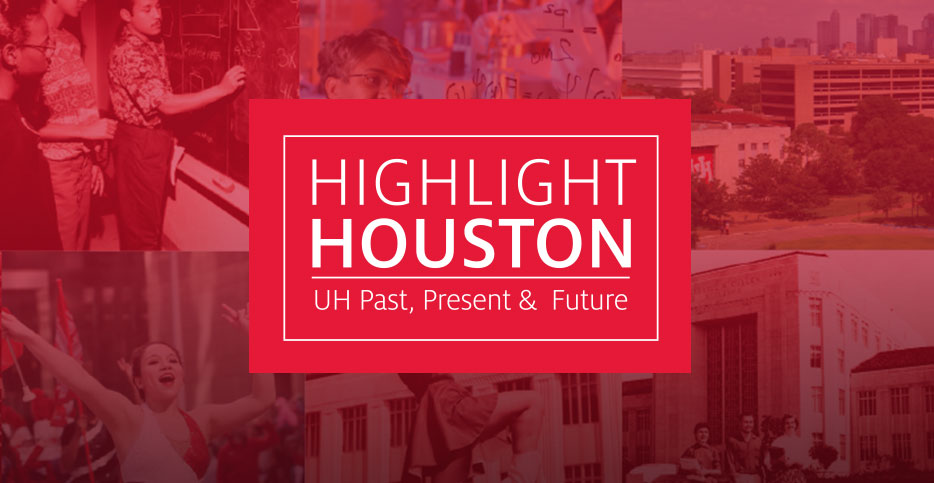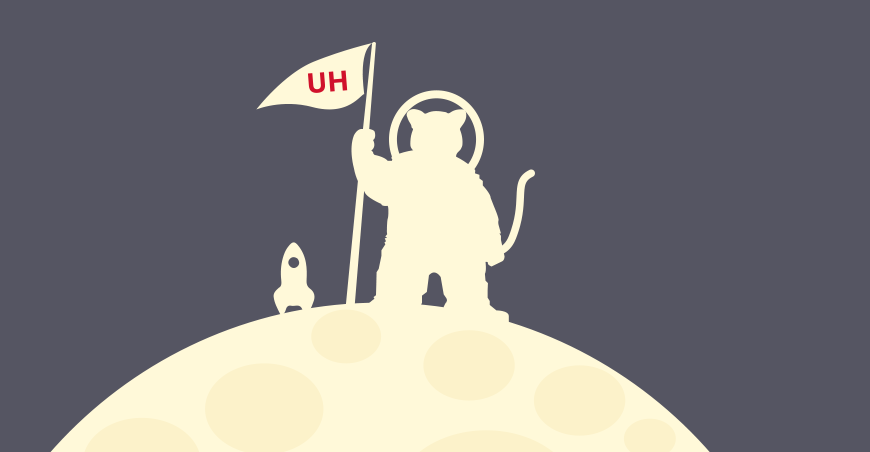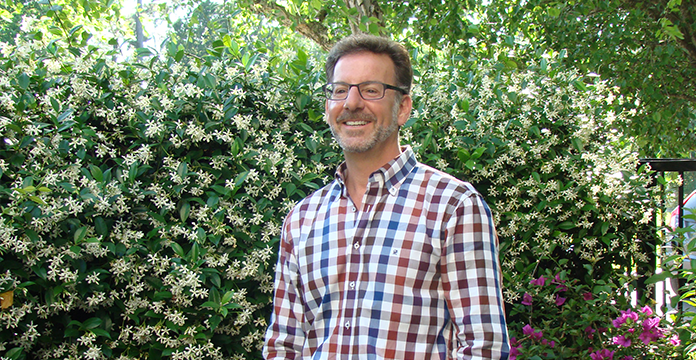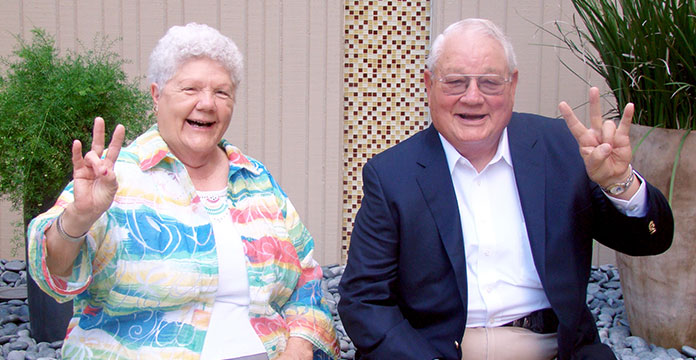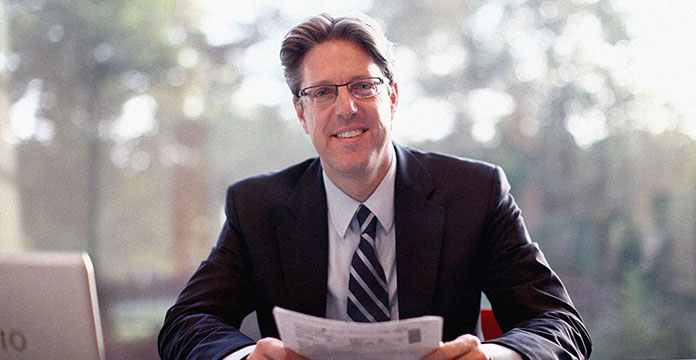
By Joelle Jameson
In his position as director of the largest lymphoma clinical research program in the world, located at M.D. Anderson Cancer Center in Houston, Dr. Nathan Fowler (’96) sees patients who have traveled from all over the world. “Half my job is connecting with a patient,” he says. “When you’re convincing them to try a certain therapy or to change their lifestyle, you have to be able to connect with them on a personal level.” When considering how he does this, Fowler recalls not only his scientific education as an undergraduate at UH, but the art, sociology and language courses that he still remembers. “Broadening your experience and background will allow you to connect with people in that way.”
As for the other half of his time at work: “We’re at the forefront of developing non-chemotherapy based approaches to treat lymphoma by harnessing the power of a patient’s immune system to target and destroy cancer cells. It’s a whole different way of thinking about treating cancer.” More literally, it involves researching and developing new cancer drugs, traveling to lecture about that research at Universities from Houston to Melbourne to Tokyo, and teaching students at M.D. Anderson, whether in the classroom or as they shadow him on his rounds. It’s the promise of those life-saving discoveries that captures Fowler’s enthusiasm and passion. “We’ve made spectacular advances in the past few years, and are really changing the way people think about treating lymphoma,” he says. “I’m lucky to be in a position at the cutting edge of what’s being developed for cancer therapy — I have to pinch myself sometimes when I think about it.”
Many of the next generation of treatments are particularly exciting because patients remain cancer-free for much longer, with minimal side effects — a huge benefit over the chemotherapy normally used. “By combining immune-based therapies and antibodies targeting cancer cells, we have been able to eradicate lymphoma using a patient’s own immune system. My ultimate dream is to get rid of chemotherapy and cure lymphoma, and I believe we’re getting closer and closer to that goal,” Fowler explains. “That’s something we never could have imagined five years ago.” The immunological treatment he developed involves employing an antibody to flag the cancer cells, then bolstering the immune system cells to find and destroy the cancer. “We used this combination for the first time ever with slow-growing lymphomas, and we saw 98 percent of patients responding,” he says. “It’s very, very exciting.” Despite high success rates, the process for trials for FDA-approval is extremely long. Fowler recently led the first International study to compare this approach to chemotherapy and hopes to have preliminary results in the next two years. “If positive, this study will lead to a paradigm shift in the way we treat many lymphomas worldwide”
Fowler is also the president and co-founder of Halo House, a non-profit that provides affordable housing to blood cancer patients as they receive treatment. That inspiration struck in his second year at M.D. Anderson, when he worked with a patient about his age from Florida who was married and had a daughter. “Surprisingly, one of the things that he thought about most was the potential of leaving his family without any money, regardless of how the cancer turned out,” Fowler recalls. “He worried that he would be leaving them not only without a father, but without most of their savings.” The source of the drain, despite having a full-time job and health insurance, was traveling from Florida every other week for treatments for two years — a typical scenario for most patients. “I found that unacceptable. It’s ridiculous that folks either don’t come here or end up losing everything they have just based on travel and lodging.” In response, he and about six others decided to start leasing out apartments to blood cancer patients for $20 per night. The project grew from six to 60 volunteers, apartments continued to be added, and now Halo House is conducting a capital campaign to build a 22-unit building near the M.D. Anderson campus. “I never would have dreamed it would take off the way it has, but everyone we’ve approached has been so enthusiastic about helping us out, from local businesses to architects to nurses and patient advocacy groups,” he says, adding that they’ve provided over 9,000 days of housing for hundreds of families, and the wait list is usually two to three months. “We have been able to accomplish so much by simply pointing out a need, and asking the community for help — it really is the definition of ‘grassroots.’”
Between keeping busy with his research, seeing patients, traveling and heading up Halo House, Fowler is happy to be home in Houston. He moved here during high school from Youngstown, Ohio, and joined the army after graduation, studying nuclear biological chemical defense. “My job was to defend the unit against chemical and biological attacks,” he explains. “So, gas masks, protective chemical suits, decontamination: that’s when I first had the idea that medicine was something I could do.” He graduated as valedictorian of his class, which is understandable for someone who would “rather read about biology instead of watch TV.” He’d heard great things about UH, and applied while he was still in the service. Fowler developed an interest in cancer treatment at the University of Texas Medical branch in Galveston, Texas — which is where he met his wife, an occupational therapist — and during a fellowship at Georgetown University in Washington, D.C., began working with a doctor who was researching lymphoma. When a position in lymphoma research became available at M.D. Anderson in 2007, he jumped at the chance to apply and move back to what he considers his hometown. “I still have family in Houston and keep in touch with lots of my UH classmates,” he says. “And it doesn’t hurt that the world’s largest research hospital for cancer is here.”
The Fowlers now have three children, ages seven, three and one, and recently paid a visit to the UH main campus — “They liked the fountains,” he says with a smile — which has changed significantly since Fowler’s time as an undergraduate. “I really enjoyed the campus experience, especially after being in the army,” he says, naming football games and Frontier Fiesta as stand-out memories. As for classes: “My experience with the basic sciences was first rate and prepared me very well for medical school,” he says. “I felt that in my first few years, I was well-equipped to handle the classes, often better than students who’d gone to other colleges. But UH also allowed me to get a really broad experience, and I really enjoyed a lot of the arts and history classes I took.” Fowler worked 34 hours per week as a server at Pappasito’s Cantina to pay for the part of his education that the army didn’t cover, and also volunteered to teach officers Spanish at the Houston Police Department. Even now, he speaks with Spanish-speaking patients without an interpreter, thanks to his Spanish minor. “Your undergraduate years are one of the few times in your life you can and take diverse classes and participate in activities that will broaden your outlook,” he says. “I would advise students to take advantage of the opportunities at UH. Try different things, because they will benefit you in the long term.”
Another piece of advice for students? “Don’t give up — that’s the most important thing,” he says. Not only does that mantra hold fast in clinical trials, but it plays into his first year at UH. “I had just come out of the army, and my study habits were not good,” he recalls. “I had a low GPA my first year, so the pre-med counselor suggested I try a different field.” That realization would be discouraging for any student, but Fowler took it as a call to action. “It motivated me; I was determined to prove I could do it. I taught myself how to study better, and I’d worked up to a 4.0 by my senior year.” In light of that experience, he advises students to pay close attention to their G.P.A.s . “Focus on subjects that you’ll do well at. It’s more important to show that you can focus on a task and complete that task successfully than take some upper level chemistry class and get a C.” That concentration ties into the home-printed statement taped to his office wall, which he says he saw in a hardware store: “We are measured by our results, not activity.” That laser-focused motivation is evident in Fowler’s work, with patients and in the classroom: accuracy, patience and working toward a concrete goal can lead to amazing results.
